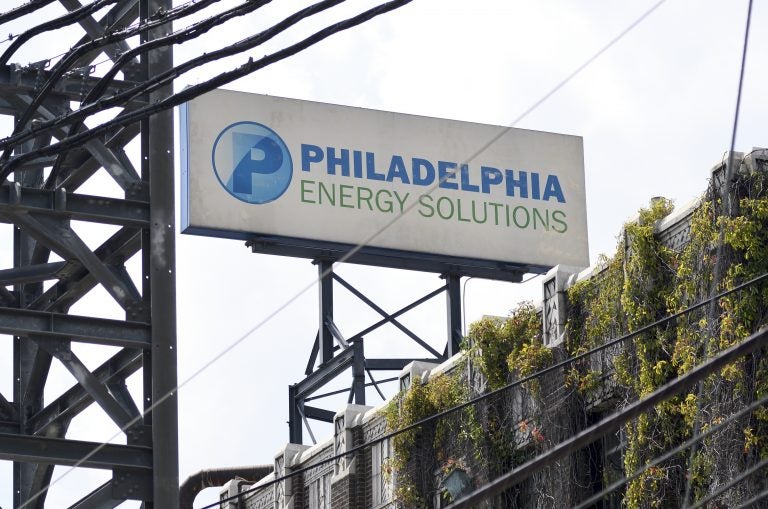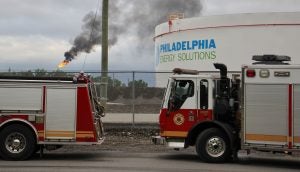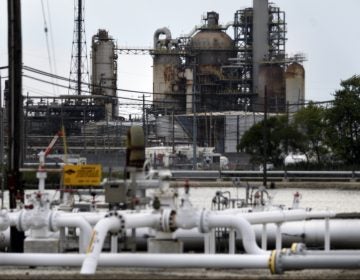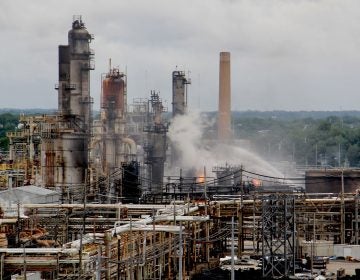New owner of PES site has no plans to continue refinery operations, city says
Brian Abernathy, who co-chaired the city’s Refinery Advisory Group, said Hilco Redevelopment Partners envisions warehouse and logistics space as likely uses.

Philadelphia Energy Solutions refinery on August 8, 2019. (Bastiaan Slabbers for WHYY)
UPDATED 5:50 p.m.
South Philadelphia residents, environmentalists and city officials welcomed news that a Chicago-based developer will purchase the Philadelphia Energy Solutions refinery complex.
Hilco Redevelopment Partners bid $240 million last Friday to become the new owner of the 1,300-acre site, according to documents filed in U.S. Bankruptcy Court in Delaware on Wednesday. The agreement of sale still has to be approved by Bankruptcy Judge Kevin Gross as part of the PES Chapter 11 proceedings. A hearing is set for Feb. 6.
Brian Abernathy, the city’s managing director and co-chair of its Refinery Advisory Group, said Hilco’s plans do not include refining, which has gone on at the site for over 150 years.
“They have indicated to us that there will not be a refinery operating,” Abernathy said.
The majority of the site is likely to be used as warehouse and logistics space for other development, taking advantage of the complex’s rail infrastructure and its proximity to the port, highways and the airport, Abernathy said. Some energy infrastructure and the tank farm may remain, he said.
The buyer has not revealed its plans publicly. In an email, Gary C. Epstein, Hilco Global executive vice president and chief marketing officer, wrote: “Hilco Redevelopment Partners, a unit of Hilco Global, cannot comment on, or confirm the results of the PES auction, the auction process or the auction results until after the bankruptcy court hearing and court final approval which is scheduled to take place in early February.”
The company, a subsidiary of Hilco Global, acquires obsolete industrial sites and remediates them to regulatory standards for further redevelopment. Recent projects include the redevelopment of a 3,200-acre site owned by a former steel mill in Baltimore into a major port and logistics center. Hilco Global is comprised of over 20 operating units, one of them Hilco Redevelopment Partners. It has offices on five continents and has done business in over 60 countries.
Abernathy said the city used its influence and spoke with Hilco representatives last Friday at the PES auction in New York. He said the city is optimistic that the firm will develop the site following the city’s recommendations.
“We wanted something safer, more environmentally friendly and conscious of the public health. We wanted multiple uses on the site and a friendlier, more welcoming environment for the community. I think that Hilco checks those boxes,” Abernathy said.
In a statement, Mayor Jim Kenney said, “Though many challenges and years of work lie ahead, we are optimistic that the firm can develop this site in a way that supports the core values in the city’s recent report summarizing the work of the Refinery Advisory Group: a diverse range of uses on the site that put the public’s safety as a top priority, has a more positive impact on the environment, engages meaningfully with the surrounding communities and contributes significantly to the region’s economy.”
Philadelphia Energy Solutions shut down operations at the site after June’s catastrophic fire and explosion damaged almost half the complex.
Legacy contamination at the site is being remediated by Evergreen Resources, a subsidiary of Sunoco, which owned the complex from 1988 to 2012. Cleanup of post-2012 contamination and environmental liabilities are the responsibility of PES and, according to the purchase agreement, will now be transferred to Hilco.
Rodney Everett has been living next to the refinery for most of his 61 years. For him, news that the site may no longer be a refinery means being able to walk down the street without worrying about getting sick or dying because of an explosion. It’s one of the best things that has happened in years, he said.
“People are paying to live in a sick area,” said Everett, a member of the local activist group Philly Thrive. “Those days, we [hope] are very much over. It’s been a long time coming and for each administration of 157 years to allow this to go on was very shameful.”
Rodney Ray, who grew up two blocks from the refinery and now lives a mile away, also cheered the news. He said he worked at the refinery for about three years, 20 years ago.
“A hundred and fifty-seven years, it’s been polluting the city, people dying from lung cancer in our community,” said Ray, who is also a member of Philly Thrive. “I watched people die. My grandfather worked at the refinery, he retired from the refinery and he passed away from lung cancer.”
The group’s organizer, Alexa Ross, said it is cautiously optimistic about seeing what Hilco’s plans actually are and how they will relate to the community. But so far, Ross said, it looks good.
On Wednesday morning, she got a call from Roberto Perez, Hilco’s CEO. He asked her to call him by his first name and said he wanted Philly Thrive to have a direct line with him.
“That’s a very good sign … for turning the page that has been PES’ complete lack of communication. So that is hopeful,” Ross said.
She added that Perez acknowledged Philly Thrive’s mission to keep the refinery shut down.
“He understands what we’re coming from and what we’re going to bring to the table,” she said. “To no longer have a refinery at the PES site would be a turning point for communicating to South and Southwest Philly that your lives matter and your lives are valuable.”
Philadelphia Clean Air Council’s director, Joe Minott, was also pleased about the news. The refinery was the largest stationary source of pollution in the city.
“With Hilco’s proposal likely to be approved by the bankruptcy court, we are cautiously optimistic about the opportunity for the site to be much less polluting than its previous use as a refinery,” Minott said. “The public must now do everything it can to hold Hilco accountable for developing the cleanest and safest uses possible at the site.”
Ryan O’Callaghan, a spokesperson for United Steelworkers Local 10-1, which represented most of the refinery’s former employees, said he’s curious to know what Hilco’s plans are.
“If it’s not a refinery, what happens with the units that are still in existence there?” he asked. “The refinery operations have been called the silent economy of Philadelphia. So when you lose a great deal of your economy, how does the city grow? We have a poverty rate of 26% already.”
O’Callaghan and many of the still-unemployed former refinery workers had hoped that the complex would keep operating and that they would regain their jobs. Having no refinery will also mean a great loss for building trades in the city, he said.
“We will continue to look for jobs,” O’Callaghan said. “Many of our former coworkers have moved out of state and that may be in the near future for the rest of us.”
Mark Smith, chief executive officer of Philadelphia Energy Solutions, said Wednesday that he had no comment on the refinery’s sale.
In a memo sent Tuesday to current PES employees that was obtained by the Philadelphia Inquirer, Smith said that the company “will continue to maintain the refinery complex, remove the hydrocarbon inventory in the facility, protect the facility and prepare for a safe handoff of the facility to HRP Philadelphia Holdings LLC, which is expected to occur within 60-90 days.”
The Pennsylvania Department of Environmental Protection fined PES a total of $136,323 in civil penalties for multiple violations of environmental laws as of Dec. 28, 2019, that were not connected with the June 21 fire and explosion.
According to a consent order and agreement filed Wednesday with the bankruptcy court in Wilmington, PES agreed to pay the penalties and to comply with specific obligations set by the DEP during the idling period before the refinery is transferred to a new owner, and during and after the transition.
The document points to nine incidents starting in November 2018 in which the refinery violated multiple rules and regulations of Pennsylvania’s Clean Stream Law by discharging industrial waste into the Schuylkill River. There are multiple violations to the Storage Tank Act, as well.
Most of the violations occurred before the company filed for Chapter 11. The $136,308 in fines constitute allowed general unsecured claims, and have been approved by the court.
PES agreed to continue to comply with environmental laws, and update and submit an Operation and Maintenance Plan addressing key wastewater processes and an Integrated Spill Response Plan by the end of January. The company will also have to submit a Closure Plan once the transfer to a new owner is completed and 90 days before a permanent shutdown and dismantling of the facility, including a discharge evaluation report of the onsite stormwater collection systems, and a detailed plan and schedule describing how accumulating stormwater will be managed and treated.
Rather than performing necessary inspections, PES agreed to temporarily remove five tanks at the Point Breeze refinery area and one tank at the Schuylkill River Tank Farm, on a timeline defined by the DEP. PES will have to remove from service all highly hazardous substance tanks at the facility by the end of February.
Failure to comply with any of the terms will result in a penalty of $500 a day for each violation.
WHYY is your source for fact-based, in-depth journalism and information. As a nonprofit organization, we rely on financial support from readers like you. Please give today.






